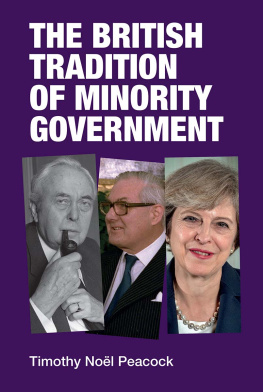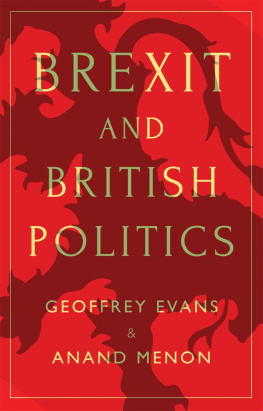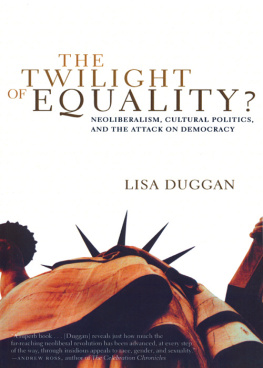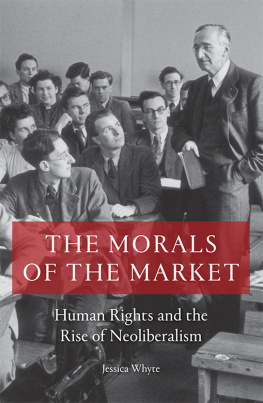Neoliberalisms in British Politics
Taking a chronological approach, this book challenges established economistic and ideologistic narratives of neoliberalism in Britain by charting the gradual diffusion of an increasingly interventionist neoliberal governmental rationality in British politics since the late 1970s, and the various means by which the project has furnished itself with a hegemonic basis for its popular support.
Spanning five decades of British political history and drawing on rich empirical evidence to bring conceptual clarity to, and chart the effects of, a style of government bound up with a host of epochal changes, it concludes by considering Brexit and the rise of Corbynism as the final act in the neoliberal saga. It then poses the question, Is British politics on the verge of a major reconstruction representing a decisive rejection of neoliberalism?
This book will be of key interest to scholars and students of British politics and neoliberalism, liberalism and, more broadly to political theory, political economy and public policy.
Christopher Byrne is Lecturer in the Department of Politics, University of Exeter, UK.
Routledge Studies in British Politics
Series Editors:
Patrick Diamond and Tim Bale
Queen Mary University, London, UK
This series aims to promote research excellence in political science, political history and public-policy making, whilst addressing a wide array of political dynamics, contexts, histories and ideas. It will retain a particular focus on British government, British Politics and public policy, while locating those issues within a European and global context.
The Struggle for Labours Soul
Understanding Labours Political Thought Since 1945
Edited by Matt Beech, Kevin Hickson and Raymond Plant
Centralisation, Devolution and the Future of Local Government in England
Steve Leach, John Stewart and George Jones
The Struggle for Labours Soul
Understanding Labours Political Thought since 1945, second edition
Edited by Matt Beech, Kevin Hickson and Raymond Plant
British Public Opinion on Foreign and Defence Policy
19452017
Ben Clements
Neoliberalisms in British Politics
Christopher Byrne
First published 2019
by Routledge
2 Park Square, Milton Park, Abingdon, Oxon OX14 4RN
and by Routledge
711 Third Avenue, New York, NY 10017
Routledge is an imprint of the Taylor & Francis Group, an informa business
2019 Christopher Byrne
The right of Christopher Byrne to be identified as author of this work has been asserted by him in accordance with sections 77 and 78 of the Copyright, Designs and Patents Act 1988.
All rights reserved. No part of this book may be reprinted or reproduced or utilised in any form or by any electronic, mechanical, or other means, now known or hereafter invented, including photocopying and recording, or in any information storage or retrieval system, without permission in writing from the publishers.
Trademark notice: Product or corporate names may be trademarks or registered trademarks, and are used only for identification and explanation without intent to infringe.
British Library Cataloguing-in-Publication Data
A catalogue record for this book is available from the British Library
Library of Congress Cataloging-in-Publication Data
A catalog record has been requested for this book
ISBN: 978-1-138-54155-9 (hbk)
ISBN: 978-1-351-01073-3 (ebk)
Typeset in Times New Roman
by Wearset Ltd, Boldon, Tyne and Wear
This research arose out of an interest in the complex relationship between Tony Blairs New Labour and what is commonly referred to as Thatcherism. In some respects, there appeared to be a great deal of continuity between Thatcherism and New Labour. For example, it is not difficult to identify lines of continuity between Thatcherism and New Labour in the area of economic policy. The Thatcher governments monetarist escapades in the early 1980s, their eschewing of the goal of full employment, and repeated attempts to rein in what was called irresponsible public spending after 1979 were all echoed in Gordon Browns adoption of his lauded golden rules in relation to fiscal policy and the 1997 decision to shift responsibility for the setting of interest rates over to the Monetary Policy Committee of the Bank of England. Likewise, looking at New Labours social policies, it is easy to draw parallels between the private finance initiatives of Labour governments after 1997 and the earlier publicprivate partnership arrangements explored by John Majors Conservative government in the early 1990s and, to a slightly lesser extent, Thatcher in the mid-1980s.








